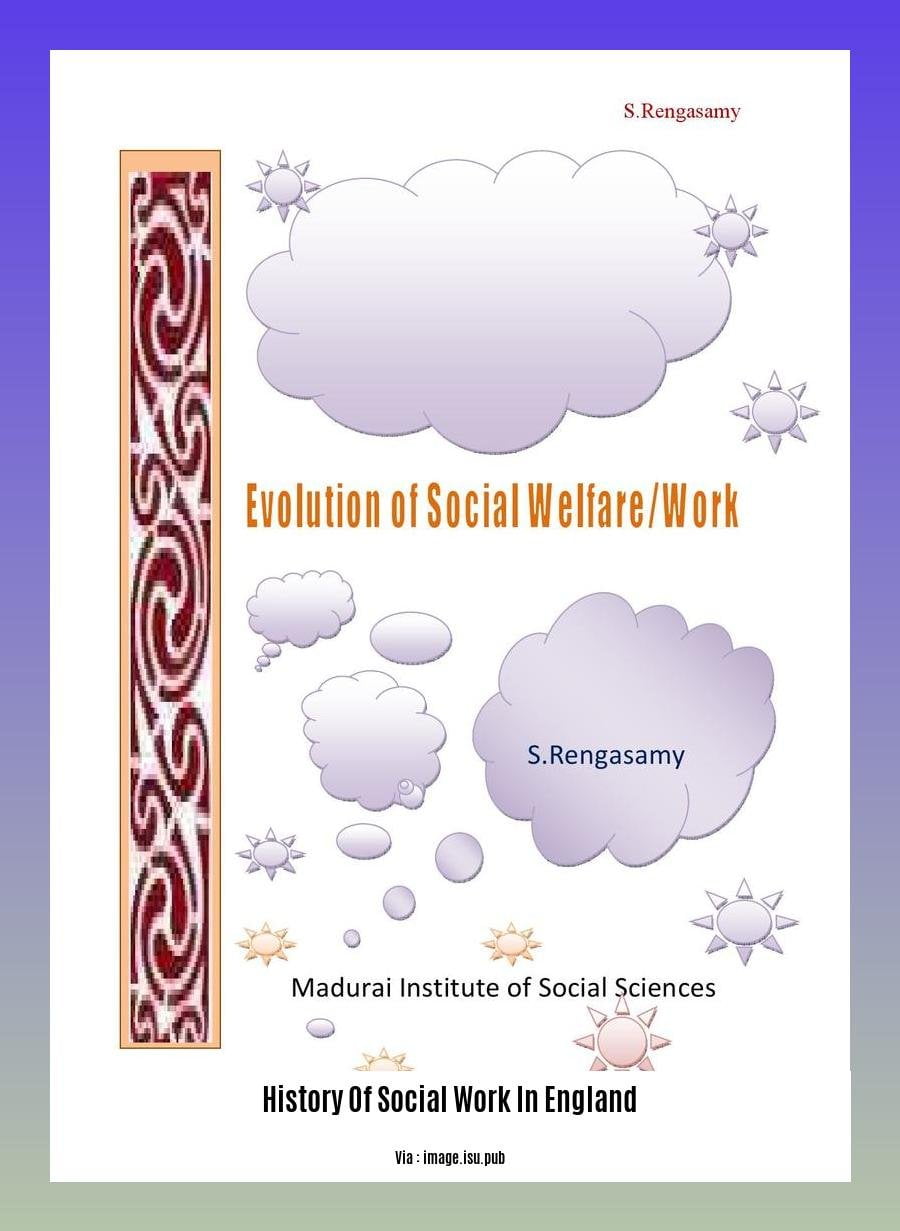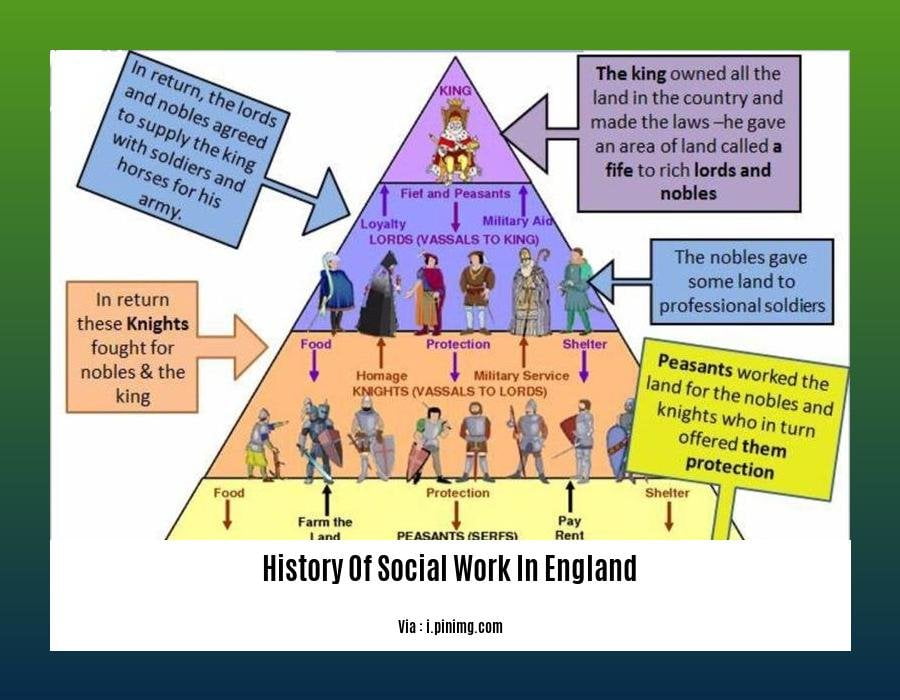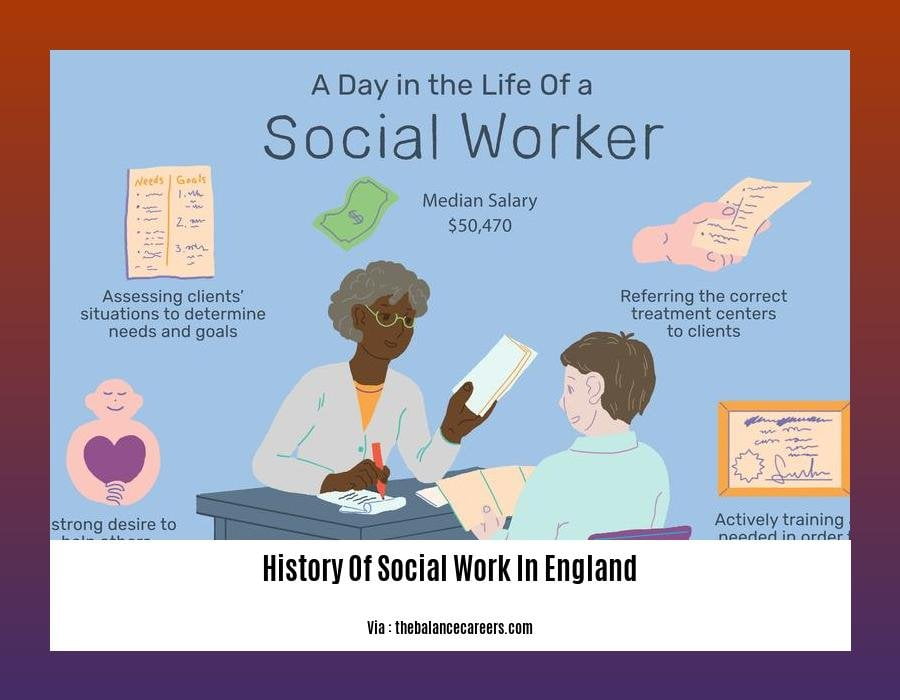Welcome to “A Journey Through Time: Exploring the History of Social Work in England.” In this fascinating piece, we will delve into the rich tapestry of the social work profession in England, tracing its evolution from its humble beginnings to its current status as a cornerstone of our society. Join us as we uncover the forgotten stories, celebrate the triumphs, and examine the challenges that have shaped the landscape of social work in England.
Key Takeaways:
- The history of social work in England is intertwined with the development and expansion of the welfare state.
- The Poor Law of 1601 played a pivotal role in shaping public welfare and the emergence of social work in the United Kingdom.
- The London Charity Organization Society (COS) was instrumental in professionalizing social work and introducing innovative practices like casework and social group work.
- The Beveridge Report of 1942 laid the foundation for the modern welfare state in the UK, resulting in a substantial increase in social work services.
History of Social Work in England

The history of social work in England is a captivating journey through time, showcasing how a nation’s commitment to social welfare has evolved. From the Poor Law of 1601 to the modern welfare state, the narrative of social work in England is a chronicle of compassion, reform, and resilience.
The Pioneering Spirit: The Early Years
The seeds of social work in England were sown in the 17th century, with the implementation of the Poor Law of 1601. This revolutionary legislation laid the foundation for state-sponsored welfare services, marking a significant shift in how society perceived and supported its most vulnerable populations.
A New Agenda for Social Welfare: The Charity Organization Society
The late 19th century witnessed the rise of the Charity Organization Society (COS) in London, a pioneering organization that sought to streamline the capital’s fragmented social services. The COS ushered in an era of professional social work, emphasizing the importance of training and establishing uniform standards of practice.
The Beveridge Report and Beyond: Reimagining Social Welfare
The Second World War served as a catalyst for profound social change in England. The Beveridge Report of 1942 envisioned a comprehensive welfare state, and the establishment of the National Health Service (NHS) in 1948 revolutionized healthcare access for millions. These reforms cemented social work’s role in the nation’s social fabric.
Social Work Today: A Thriving Profession Embracing Diversity
Modern social work in England continues to evolve, reflecting the country’s ever-changing social landscape. The profession has broadened to encompass a diverse range of specializations, tackling societal challenges such as mental health, addiction, family welfare, and homelessness.
The Heart of Social Work: Values and Principles
Underpinning the history of social work in England is a bedrock of values and principles that guide the work of social workers. These include:
- Dignity and Respect: Every individual is valued and treated with respect, irrespective of their circumstances.
- Social Justice: Social workers strive to combat inequalities and promote a just and equitable society.
- Empowerment: Supporting individuals to take control of their lives and achieve their full potential.
Leading Figures in England’s Social Work History
Throughout the history of social work in England, several visionary individuals have left an indelible mark on the profession:
- Octavia Hill (1838-1912): A pioneering social worker who advocated for better housing conditions for the working class and co-founded the COS.
- Charles Booth (1840-1916): Conducted groundbreaking social surveys in London, shedding light on the extent of poverty and destitution.
- Beatrice Webb (1858-1943): A prominent social reformer and co-founder of the London School of Economics, played a key role in the development of the British welfare state.
Conclusion
The history of social work in England encapsulates a journey of innovation, compassion, and unwavering dedication to improving the lives of those in need. Social workers continue to play a pivotal role in shaping a society where everyone has the opportunity to thrive and reach their full potential.
- Get insights into the journey and progression of scouting in the Philippines through time by following this link: history of scouting in the philippines.
- Discover the development and growth of social studies education in Nigeria by exploring its history in our comprehensive resource: history of social studies education in nigeria.
- Learn about the evolution and impact of social work in the United Kingdom by tracing its rich history here: history of social work in uk.
The development of the social casework method, pioneered by Mary Richmond in the late 19th century, introduced a personalized approach to understanding and addressing individual and family problems.
Mary Richmond, the catalyst of social casework in America, stepped into the scene in the late 19th century. While her contemporaries championed societal change, Richmond took a different path, focusing on the individual’s journey. Her social casework method aimed to improve relationships, foster personal growth, and encourage self-determination.
Richmond’s methodology thrived on understanding clients’ feelings, emphasizing purposeful emotional involvement, and embracing non-judgmental attitudes. Her groundbreaking work, “Social Diagnosis,” published in 1917, set the stage for scientific methodology in professional social work.
Key Takeaways:
- Mary Richmond, a social work pioneer, emerged in the late 19th century, prioritizing individuals over societal changes.
- Richmond’s social casework method revolutionized the field, emphasizing personal growth, improved relationships, and client self-determination.
- Understanding clients’ feelings, purposeful emotional involvement, and non-judgmental attitudes were cornerstones of Richmond’s approach.
- Richmond’s “Social Diagnosis” laid the foundation for scientific methodology in professional social work.
Sources:
Mary Richmond and the Origins of Social Casework in America
History of the Social Casework Method
The establishment of the School of Sociology and Social Work in Liverpool in 1898 marked a significant milestone in the professionalization of social work, providing formal training and education for social workers.

Liverpool’s ascent as a preeminent center for sociology and social welfare education took root in 1898, with the inception of the School of Sociology and Social Work. This trailblazing institution heralded a paradigm shift in social work, transitioning it from a largely volunteer-based endeavor to a formally structured profession rooted in rigorous training and higher education.
The school’s establishment was a response to the dire social conditions prevalent in the rapidly industrializing city of Liverpool. With poverty, overcrowding, and disease rampant, the need for trained professionals to address these challenges was paramount. The school’s curriculum, designed to equip students with the knowledge, skills, and values essential for effective social work practice, proved instrumental in shaping the future of the profession.
This pioneering institution attracted students from diverse backgrounds, united by a common desire to make a positive impact on society. Through rigorous coursework, field placements, and mentorship from experienced practitioners, these aspiring social workers gained the expertise and empathy necessary to navigate the complex challenges faced by vulnerable populations.
The school’s influence extended beyond its classrooms, radiating outward to shape the broader social work landscape. Its graduates disseminated their knowledge and skills throughout the country, establishing new social work programs and advocating for improved social policies.
The establishment of the School of Sociology and Social Work in Liverpool marked a seminal moment in the evolution of social work in England. It laid the groundwork for the professionalization of the field, ensuring that social workers possessed the requisite training and education to effectively address the pressing social issues of their time.
Key Takeaways:
The School of Sociology and Social Work was founded in Liverpool in 1898, marking a pivotal moment in the professionalization of social work in England.
The school’s curriculum emphasized the importance of formal training and education, equipping students with the knowledge, skills, and values essential for effective social work practice.
Graduates of the school played a crucial role in shaping the future of social work in England, establishing new programs and advocating for improved social policies.
The school’s legacy continues to this day, as the University of Liverpool remains a leading center for sociology, social policy, and social work education.
Sources:
The University of Liverpool: Department of Sociology, Social Policy and Criminology
Social Work History Project: Mary Richmond
The influence of the Beveridge Report in 1942 laid the foundation for the modern welfare state in England, emphasizing the importance of social security and universal access to healthcare and other social services
Key Takeaways:
- The Beveridge Report was instrumental in shaping the modern welfare state in Britain.
- It aimed to address the five “Giant Evils” of Want, Disease, Ignorance, Squalor, and Idleness.
- The report led to the establishment of the National Insurance Act of 1946 and the National Health Service in 1948.
- Beveridge’s vision of a more equitable society continues to influence social policy in Britain today.
The Beveridge Report was a defining moment in the history of social welfare in Britain. Published in 1942, the report laid the groundwork for the creation of a modern welfare state that would provide social security and universal access to healthcare and other essential services.
At the time, Britain was still reeling from the effects of World War II, and millions of people were living in poverty. Beveridge’s report was a response to this crisis, and it set out a vision for a more just and equitable society.
Beveridge identified five “Giant Evils” that he believed were responsible for poverty: Want, Disease, Ignorance, Squalor, and Idleness. He argued that these evils could be overcome through the creation of a comprehensive social welfare system.
The Beveridge Report made a number of recommendations, including:
- The establishment of a national insurance system to provide income support to people who were unable to work due to illness, unemployment, or old age.
- The creation of a National Health Service to provide free healthcare to everyone in Britain.
- The expansion of education and other social services to ensure everyone had the opportunity to reach their full potential.
The Beveridge Report was met with widespread support from the British public, and it played a key role in shaping the postwar settlement. The National Insurance Act of 1946 and the National Health Service Act of 1948 were both based on the principles set out in the Beveridge Report.
The Beveridge Report has had a profound impact on British society. It has helped to create a more just and equitable society, and it has provided a model for other countries around the world. Beveridge’s vision of a society in which everyone has the opportunity to live a fulfilling life is still relevant today.
Sources
Beveridge, W. (1942). Social Insurance and Allied Services. London: HMSO.
The National Archives
The Beveridge Report
FAQ
Q1: When did the history of social work in England begin?
A1: The history of social work in England can be traced back to the Poor Law of 1601, which laid the foundation for public welfare and social work in the country.
Q2: What was the role of the London Charity Organization Society (COS) in the development of social work?
A2: The London Charity Organization Society (COS) played a crucial role in professionalizing social work and introducing new methods of social work practice, such as casework and social group work.
Q3: Who is regarded as the founder of social casework in America, and what was her approach?
A3: Mary Richmond is widely recognized as the founder of social casework in America. She focused on the individual rather than promoting societal changes and developed the social casework method, which aimed to improve individuals’ relationships with others and promote their personal growth.
Q4: What was the significance of the Beveridge Report in shaping the welfare state in Britain?
A4: The Beveridge Report, published in 1942, had a profound impact on the foundation of the welfare state in Britain. It aimed to address the “Five Great Evils” – want, disease, ignorance, squalor, and idleness – through the establishment of a comprehensive social welfare system.
Q5: What is the role of the University of Liverpool in social work education and research?
A5: The University of Liverpool is a leading center for sociology, social policy, and criminology. It offers undergraduate and postgraduate programs in sociology and social policy, plays a significant role in the Social Work Action Network (SWAN), and conducts research focused on social justice and cutting-edge projects and publications.









